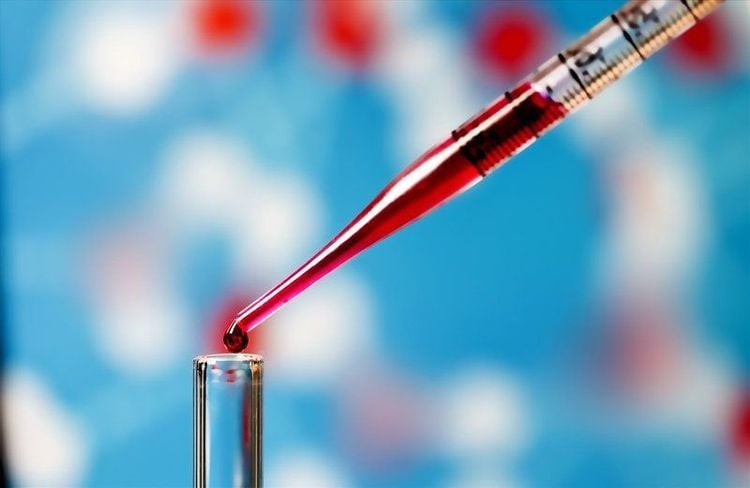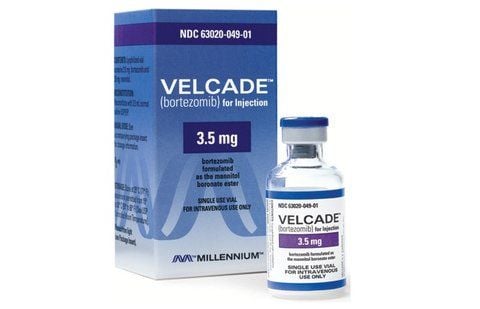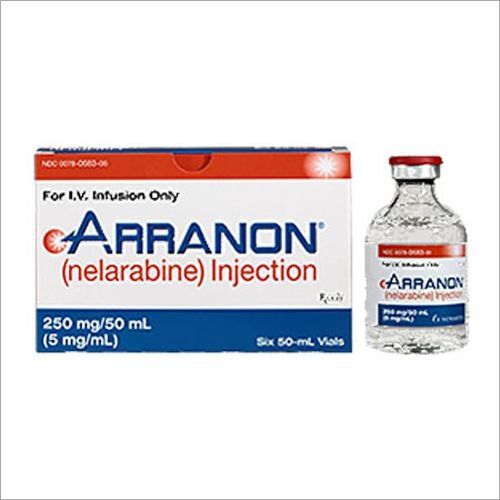This is an automatically translated article.
The article was professionally consulted by Doctor Do Thi Hoang Ha - Doctor of Biochemistry - Laboratory Department - Vinmec Hai Phong International General HospitalTumor markers are used to help detect, diagnose, and monitor treatment for some types of cancer. The beta-2 microglobulin test can be used as an oncological marker in multiple myeloma, malignant lymphoma, and in chronic lymphocytic leukemia. This test can also be used as a biomarker in the assessment of renal filtration and reabsorption dysfunction.
1. Beta-2-microglobulin test - Cancer marker
Beta-2-microglobulin (abbreviated as B2-M or β2-M) is a small 11.8 kDa membrane protein composed of 100 amino acids. Quantitative B2M test can be used as a cancer marker, contributing to the diagnosis, classification, prognosis, monitoring the effectiveness of treatment in multiple myeloma, malignant lymphoma, lymphoma ...Beta-2-microglobulin is present on the surface of all nucleated cells, and is freely filtered across the glomerular membrane and is reabsorbed almost completely in the proximal tubule. Beta-2-microglobulin is always present in small amounts in plasma, cerebrospinal fluid, and urine in normal individuals. Serum beta-2-microglobulin levels may be increased in diseases associated with increased cell turnover such as in some malignancies, especially B lymphocyte-associated blood malignancies. Urinary beta-2-microglobulin levels may be elevated due to decreased tubular reabsorption as in patients with tubular disease, renal failure, and amyloidosis.
In addition, serum beta-2-microglobulin levels are also increased in some benign non-renal diseases such as chronic inflammatory disease, liver disease, acute viral infections, rheumatoid arthritis and autoimmune diseases.
2. How is the Beta-2-microglobulin test used?

3. Normal value of Beta-2-microglobulin . test
In normal healthy subjects, serum or plasma beta-2-microglobulin quantification is 0-3 μg/mL or 0-3 mg/L; The urine beta2-microglobulin level is 0-0.3 μg/mL or 0-0.3 mg/L.Low plasma beta-2-microglobulin levels are considered normal. Levels of beta2-microglobulin in normal urine and cerebrospinal fluid may be undetectable.
4. Significance of Beta-2-microglobulin . test

In patients with this condition, a plasma beta-2-microglobulin level <4 μg/mL correlates with a higher survival rate. A patient with a high plasma beta-2-microglobulin level > 4 μg/mL had a median survival of only 12 months, while a patient with a low plasma beta2-microglobulin level < 4 μg/mL had a median survival time of only 12 months. Median survival was 43 months.
To assess prognosis, the International Staging System also divides multiple myeloma into 3 stages based on beta-2-microglobulin and serum albumin:
Stage 1: Beta-2 -microglobulin <3.5μg/mL and serum albumin ≥35g/L. Stage 2: Beta-2-microglobulin between 3.5 and 5.5 μg/mL and any serum albumin or beta-2-microglobulin level <3.5 μg/mL and serum albumin < 35g/L. Stage 3: Beta-2-microglobulin ≥5.5 μg/L. 4.2. Significance of beta-2-microglobulin in the diagnosis of kidney disease If the plasma beta-2-microglobulin level is elevated and urine is decreased, the disorder may be related to impaired glomerular filtration. If the plasma beta-2-microglobulin level is decreased but the urine is increased, the patient may have renal disease due to tubular damage, resulting in decreased reabsorption of the proximal tubule.
In patients on long-term hemodialysis, an increase in the level of plasma beta-2-microglobulin has been associated with dialysis-associated amyloid nephropathy. In kidney transplant patients, an increased level of beta-2-microglobulin in the urine may indicate an early rejection.
The level of plasma beta-2-microglobulin may also be elevated in some other conditions such as dialysis amyloid amyloidosis, cadmium (Cd) or hydronuclear (Hg) toxicity, diabetic nephropathy type 2 glucose (usually evaluated with plasma cystatin-C levels).
An increase in the level of beta-2-microglobulin in the cerebrospinal fluid in patients with HIV/AIDS suggests that the disease may have involved the central nervous system.
Currently all cancer markers can be performed at Vinmec Hospital System, especially at Vinmec Times City, but the designation to bring its true value is very necessary. the advice of an oncologist, avoiding the situation of looking at tumor markers only and ignoring the diagnosis of cancer at an early stage, or sometimes in an uneasy mood when the test shows markers. A higher than normal rate of cancer occurs in non-cancerous conditions. The consultation of specialists in combination with clinical symptoms and other specialties is very important and necessary.
Vinmec International General Hospital is one of the hospitals that not only ensures professional quality with a team of leading medical doctors, modern equipment and technology, but also stands out for its examination and consultation services. comprehensive and professional medical consultation and treatment; civilized, polite, safe and sterile medical examination and treatment space. Customers when choosing to perform tests here can be completely assured of the accuracy of test results.
Please dial HOTLINE for more information or register for an appointment HERE. Download MyVinmec app to make appointments faster and to manage your bookings easily.














